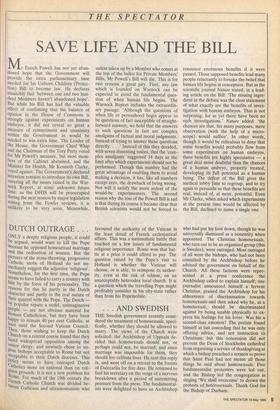. . . AND SWEDISH
THE Swedish government recently consi- dered the treatment of homosexuals, speci- fically, whether they should be allowed to marry. The views of the Church were solicited: the Archbishop of Uppsala de- cided that homosexuals should not, or perhaps could not, be married; and since marriage was impossible for them, they should live celibate lives. He sent this reply in, and went off on a retreat to the forests of Dalecarlia for five days. He returned to find his secretary on the verge of a nervous breakdown after a period of unremitting pressure from the press. The fundamental- ists were delighted to have an Archbishop who had put his foot down, though he was universally dismissed as a nonentity when appointed. The Christian homosexuals, who turn out to be an organised group (this is Sweden), were outraged. Most outraged of all were the bishops, who had not been consulted by the Archbishop before he advised the government on behalf of the Church. All these factions were repre- sented at a press conference the, Archbishop called to explain himself; one journalist announced himself a fervent Christian, praised the Archbishop for his abhorrence of discrimination towards homosexuals and then asked why he, as a homosexual, should be discriminated against by being unable physically to ex- press his feelings for his lover. Was his a second-class emotion? The prelate found himself at last conceding that he was only offering advice, and not instruction to Christians; but this concession did not prevent the Dean of Stockholm cathedral from organising a service of thanksgiving at which a bishop preached a sermon to prove that Saint Paul had not meant all those things he said about homosexuals. Five fundamentalist protesters were led out, and the Bishop led the congregation in singing 'We shall overcome' to drown the protests of heterosexuals. Thank God for the Bishop of Durham.














































 Previous page
Previous page